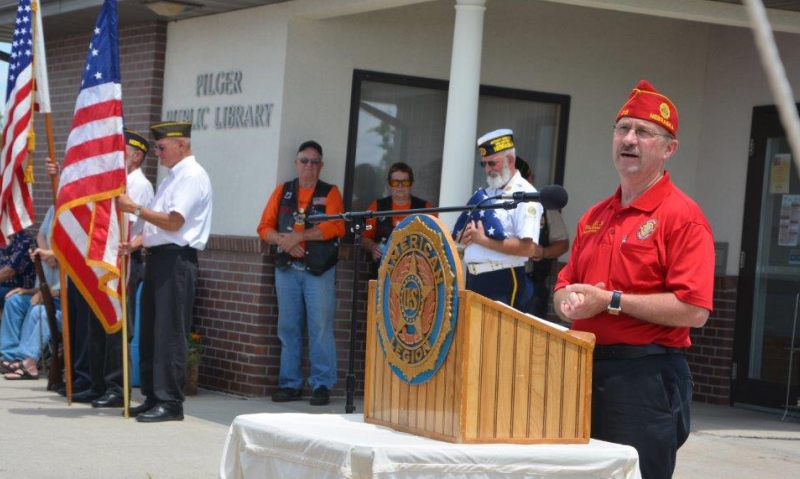
Flag Day in ‘the town too tough to die’
 View Photo Gallery
View Photo Gallery
Michael D. Helm’s red American Legion cap bears two pieces of information – his title, “National Commander" and his home department, “Nebraska.”
Given the inspirational recovery from two deadly tornadoes which wreaked havoc on the tiny town of Pilger, Neb., a year earlier, it is understandable why Helm chose to spend Flag Day addressing residents of that community.
“It’s good to be here in Pilger,” he said. “I am the national commander of The American Legion, the largest veterans service organization in the United States. But today, being here in Nebraska, the proudest thing that I have on my hat is ‘Nebraska.’ So thank you for having me here for this very, very special moment.”
It was indeed a special moment for Pilger, which thanks to the efforts of the Nebraska American Legion Family dedicated a new flag pole outside the local library to serve not just as a symbol of the town’s patriotism but of its resiliency.
The 2010 census recorded a population of 352 in the farming community 85 miles northwest of Omaha. It seemed like there were nearly that many American Legion Riders, Legionnaires, Auxiliary members, Boy Scouts, local residents and dignitaries gathered to witness the flag raising on June 14.
“The year 2050 is not too far away,” Nebraska Lt. Gov. Mike Foley told the gathering. “By the year 2050, another 2 billion people will join us on planet Earth, and they are going to need food. It is communities like Pilger that are going to play a central role in feeding the world and Nebraska is doing so well because of your hard work.”
The dedication day was hard to envision when almost exactly one year earlier on June 16, 2014, twin tornadoes carved a path of destruction through the town, claiming the lives of 5-year-old Calista Dixon and 74-year-old David Herout. The fire department was severely damaged, a church was completely leveled and dozens of homes destroyed.
Over the next two months, The American Legion distributed $13,450 in grants to eligible residents through the National Emergency Fund.
“Fifteen hundred dollars might not seem like a lot to someone who lost everything, but it’s a little seed money to get going on food, drinks and some clothing that you lost,” American Legion National Executive Committeeman Jerry Landkamer said, referring to the maximum individual grants allowed through the program.
The American Legion Riders led the efforts to raise funds for the flagpole and, with support of the Legion Family and other supporters, donated an additional $4,500 to help the town’s recovery efforts.
Nebraska Sen. Paul Schumacher believes that despite the tragedy, Pilger has the opportunity to create a community better suited for future economic times. Pointing out that most of the town’s original development occurred in the early 20th century, he echoed Foley’s point about the growing demand for agriculture.
“What would happen if communities could redesign themselves?” he asked. “Not rebuild because it’s clear that they were originally built for the 1920s. But redesigned for the purposes of serving a new agriculture, a new economy with seven soon to be nine billion people in it. And most communities can’t because what do you do with the old buildings that were built for 1920 but just don’t work anymore? Pilger has been cast into a new role. You don’t have to worry about what to do with a lot of old buildings or an old main street. You have the challenge of showing the rest of Nebraska what you can do when you redesign a community for the 21st century instead of trying to maintain one from the early 20th century.”
Neighboring State Sen. Lydia Brasch recalled the night of the tragedy and the strengths of the Pilger residents. “That night I saw a lot of tears. Belongings that weren’t where they should be. Mattresses up on the roof. Grain bins tipped over. But you’re strong. You did not wait for the government to come help you. Everyone was helping each other. You were helping yourselves. From the first minute, you moved forward. And that’s why I am so proud and honored to serve you.”
“We’ve seen the flag raised at Iwo Jima, and I just returned from Normandy where the flag was proudly raised,” Helm told the crowd. “But today, we raise the flag in Pilger as a sign of resilience and victory over tragedy. Congratulations Pilger. You are the community that won’t die. Keep up the good work!”
